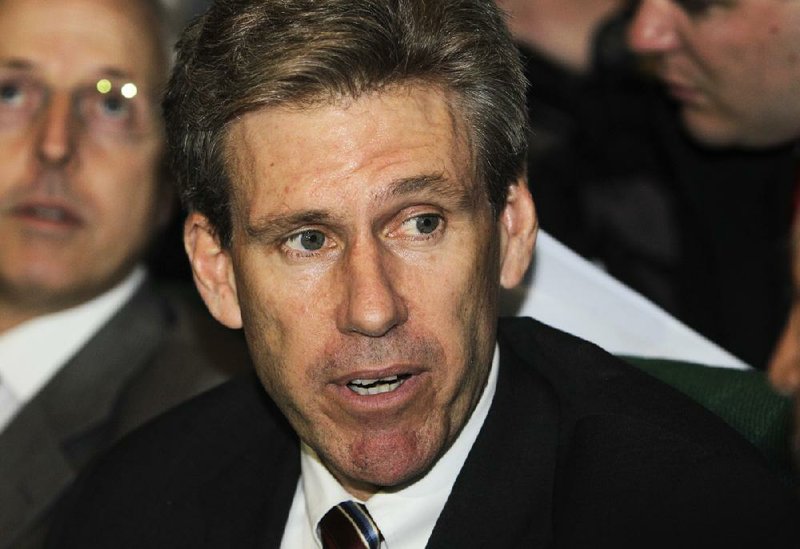WASHINGTON — An independent inquiry into the attack on the U.S. diplomatic mission in Libya that killed four Americans on Sept. 11 sharply criticizes the State Department for a lack of seasoned security personnel and for relying on untested local militias to safeguard the compound, congressional and State Department officials said Tuesday night.
The investigation into the attacks on the mission and CIA annex that killed Ambassador Christopher Stevens and three others also faulted State Department officials in Washington for ignoring requests from officials at the U.S. Embassy in Tripoli for more guards and safety upgrades for the diplomatic mission.
The inquiry panel also blamed the State Department for waiting for specific warnings of imminent attacks to act rather than adapting security procedures and protocols to a deteriorating security environment. By this spring, Benghazi, a hotbed of militant activity in eastern Libya, had experienced a string of assassinations, as well as an attack on a British envoy’s motorcade.
On June 6, a bomb was planted near the U.S. mission’s outer wall, blowing out a 12-foot hole.
Finally, the report also blamed two major State Department bureaus — Diplomatic Security and Near Eastern Affairs — for failing to coordinate and plan adequate security at the mission. The panel also determined that a number of officials had shown poor leadership.
In response to the panel’s findings, Secretary of State Hillary Rodham Clinton said in a letter to Congress that she was accepting all 29 of the panel’s recommendations, several of which are classified.
Clinton is taking specific steps to correct the problems, according to officials. They say the State Department is asking permission from Congress to transfer $1.3 billion from funds that had been allocated for spending in Iraq. This includes $553 million for additional Marine Corps security guards; $130 million for diplomatic security personnel; and $691 million for improving security at installations abroad.
On Monday, the independent panel that was established to investigate the attack presented the report to the State Department. The panel, called an accountability review board, is led by Thomas Pickering, a veteran diplomat. It includes four other members, among them Mike Mullen, the retired admiral who served as chairman of the Joint Chiefs of Staff.
The board is authorized by a 1986 law intended to strengthen security at U.S. diplomatic missions.
The State Department sent a lengthy classified version of the report to Congress on Tuesday. Pickering and Mullen are to meet with members of the Senate Foreign Relations Committee and the House Foreign Affairs Committee in closed session today.
On Thursday, William Burns and Thomas Nides, both deputy secretaries of state, will testify to both panels. Clinton, who is still recovering from a concussion she suffered last week after fainting while sick from a stomach flu, is at home this week.
The head of the House panel, Rep. Ileana Ros-Lehtinen, R-Fla., however, has made it clear that she plans to ask Clinton to testify at a future time.
The independent review panel said the State Department had “grossly inadequate” security at the U.S. mission in Libya before the deadly attack and must overhaul procedures to correct “systemic failures.”
The panel found the State Department showed “a lack of proactive leadership and management ability,” though no government employees breached their duties in connection with the assault.
There was no intelligence providing any warning of the attack, in which armed men breached the compound walls, and there wasn’t enough time for U.S. military forces to have made a difference in responding after the assault began, the panel found.
Failures by the State Department resulted in a “security posture that was inadequate for Benghazi and grossly inadequate to deal with the attack that took place,” according to an unclassified version of the report.
The review board was required to assess whether security procedures were adequate and properly implemented, as well as whether adequate intelligence was available.
The attack became a flash point in the presidential election. Republicans accused the Obama administration of failing to provide adequate diplomatic security before the attack, making inadequate efforts to rescue Americans under siege, and misleading the public afterward about what happened.
Questions from Republican lawmakers over the handling of the attack by Obama’s administration helped spur the withdrawal of Susan Rice as a possible successor to Clinton. Rice, the U.S. ambassador to the United Nations, was criticized for saying on television talk shows five days after the attack that the incident began as a spontaneous protest that was later “hijacked” by militants.
James Clapper, the U.S. director of national intelligence, issued a statement through his spokesman 12 days after Rice’s TV appearances, saying the intelligence community had revised its initial assessment and concluded that the assault was “a deliberate and organized terrorist attack.”
The independent review panel confirmed that contrary to initial accounts, there was no protest outside the consulate and said responsibility for the attack rested entirely with the terrorists who attacked the mission.
On the night of Sept. 11, as protests over an anti-Islamic video raged in Cairo and other Arab cities, militants stormed the U.S. diplomatic compound in Benghazi and set it on fire, leading to the deaths of Stevens and information specialist Sean Smith. The militants later fired mortars at the CIA compound where some people from the diplomatic mission had sought refuge.
As the CIA annex took mortar fire, some rounds landed on the roof, killing Americans Tyrone Woods and Glen Doherty, two former Navy SEALs who were working as security personnel.
Information for this article was contributed by Eric Schmitt and Michael R. Gordon of The New York Times; by David Lerman of Bloomberg News and by Matthew Lee and Kimberly Dozier of The Associated Press.
Front Section, Pages 4 on 12/19/2012

